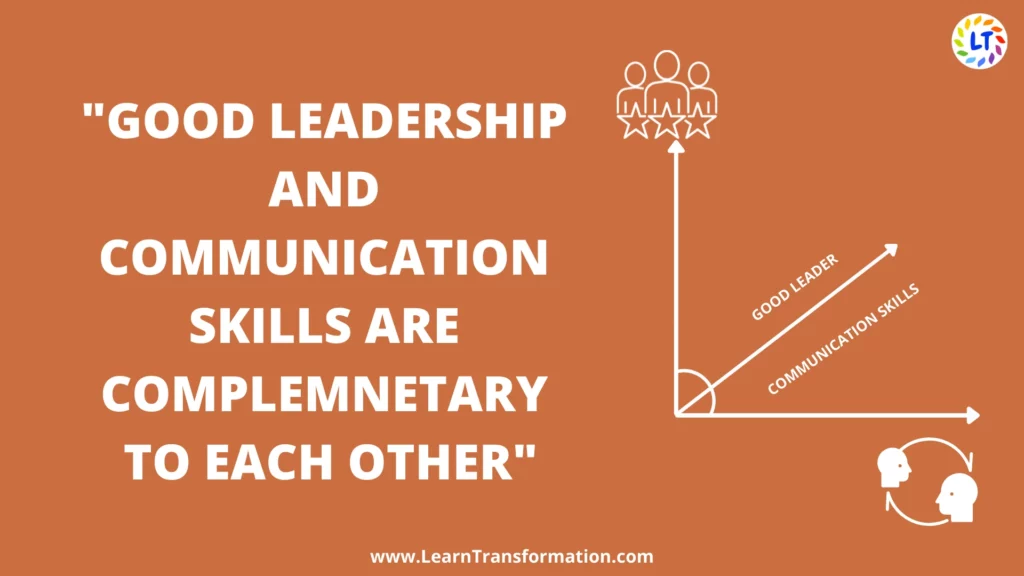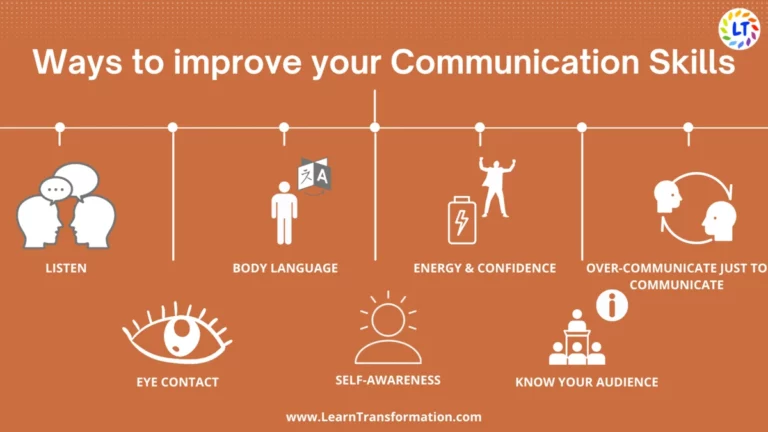The most important thing in communication is to hear what isn’t being said” Peter Drucker.
Owning powerful communication skills will help you in every aspect of your life. This is mostly true in the workplace. Have you ever grappled to get your message across? Maybe you tried throwing a innovative project, you were chairing a meeting, or you required to deliver a riveting presentation. You gave it your best hit but felt like others were banishing your opinions & input or do you feel like you can’t get your point across when requesting something in a conversation? One of the main reasons for this is a lack of energetic communication.
How to Improve Communication Skills for a Strong Leader?
To be a great leader you should have strong communication skills. Whether you’re the CEO of a Fortune 500 company, or a young entrepreneur just began, communication skills are achingly important.
Successful leaders are able to significantly communicate with others. Steve Jobs motivated his employees to aim for perfect hardware products. Jeff Bezos is known for elocuting the Amazon spirit clearly to employees & the world. All of these leaders own marvelous communication and leadership skills.
Sometimes, it’s the small things that make the difference between an average leader & a great leader. The skills & traits we show when we speak one-on-one or to a group— active listening, body language, speaking graciously & so on—tell others a lot about us. Great leaders inspire & encourage. They also train people, share new ideas & negotiate. These activities have one thing in common: They all need excellent communication.
When starting a conversation, always ensure the time is right & that you have the other person’s complete attention. Communication is the key to developing trust mutually & within a team, and trust is important to great performance & outcomes.
The aim is to master communication & have a clear direction of how to use it to bring positive results in the workplace & in every conversation.
7 Ways to improve your Communication Skills

You have seen so many tricks, tips, & techniques to improve communication skills. But I don’t want to flood you with fancy information, so let’s concentrate on the things that will offer the major give back on your time investment.
1. Listen
Listening is an art that needs attention over talent, spirit over ego, others over self. To be a good listener is half the work done to be a good communicator. You’ll never be an expert communicator if you’re always talking & never listening. People can literally answer questions in a relevant way if they possess the ability to genuinely listen to someone.
Being an active listener is one of the best ways to inspire open communication with your employees. When you really listen to your employees, they won’t delay to come to you again when they require to talk about an issue.
Focus on truly listening to the other person in a conversation, in place of thinking about what you’re going to say next. An outstanding way to improve your listening ability is to practice sympathetic listening. If the person you’re listening to is excited, show them excitement, if they are concerned, share the concern. Give back the other person’s emotions not only orally, but also with your facial expressions. Yes, it takes a little energy, but it will help you to target the same emotions which they are feeling.
Read Also: Best Happiness Books-31 Best Books For All Aspiring Readers
2. Eye Contact
It can be very alarming to have direct eye contact with the audience when one is speaking, but the person who is able to achieve it directs considerable attentiveness. To be recognizable, you should have such a commanding presence.
Don’t look at the clock, your shoes, or even up at the air. It presents a sense of nervousness. Great leaders are very aware to not let their attention diverge while speaking. Sometimes, just looking a bit above the audience does the trick, because the people in front might think you are looking at the people behind them.
3. Interpreting Body Language
Glenn Wilson writes in his book, Introducing Body Language – A Practical guide: “If body language disagrees with the words what is being said, the body language will generally be the more ‘truthful’ in disclosing true feelings.” In common, the best criterion is to embrace open body language whenever possible at work. It means easing your posture, not crossing your arms & have an eye contact with the people when speaking with them.
f you’re able to read thoughts & sentiments that aren’t disclosed by a person’s words, you have several understandable advantages. For instance, during the interview, to determine how honest a candidate is being with you & whether the person feels confident in what they are saying to you. Reading body language also offers you an advantage during negotiations, delivering presentations & conducting meetings. When you are speaking in front of others, stand up straight & speak in a clear voice. This will convey confidence in your words.
Leader’s Tip
Encourage an atmosphere of open and honest dialogue by listening attentively and sympathetically.
4. Self-Awareness
If you can convey to an audience that you are the most riveting person in the room, then you come in the list of great speakers. A great leader always motivates their audience to be the most riveting person that they know. Every great communication process begins from knowing yourself—you need to be aware of your inner self. The more aware you are about yourself, how others recognize you & how you grasp the information the world presents you, the better you are able to connect.
Having conviction & confidence in what you say translates into what you do, how you carry yourself & how you pass on your message. The best way to be a great leader is to begin with you: Believe in yourself. If you yourself don’t believe in you, then why would anyone else?
Best Video for you
5. Energy & Confidence
The thing that makes people praise leaders is their confidence & energy. When you say something with confidence & energy, it vibrates, inspires & fascinates. This is a skill & you can completely learn it. Once you become confident & learn how to transmit this feeling with your speech & appearance, body language, people will naturally want to follow you. Confidence is mainly recognized by nonverbal signs, and very often, you don’t have to talk much to come across as a confident guy. Some of the practical tips would be to keep your back straight & your shoulders open; smile or have a friendly expression on your face, and have an eye contact & call them by their name.
6. Know Your Audience
Great communicators always know their audience. You need to deliver your messages distinctly for distinct people. It means that you need to modify the way you speak & deliver your message depending on who you’re talking to. Suppose if you know a colleague who’s very serious, for example, you don’t want to go into a meeting with them & crack jokes. Considering other colleague who loves to laugh, now you can crack jokes with them.
If you regard the audience when communicating, you’ll get better results from the conversation. It’s all about learning who you’re speaking to, which needs observation & listening skills.
Leader’s Tip
Make sure your communication is clear and real while adjusting your style to diverse audiences.
7. You have to over-communicate just to communicate
Over communicating means to make sure that the other person understands the important parts of what you are sharing with them.
Bottom Line
Owning strong communication skills will help you in different phases of your life & most definitely, in the workplace. Good communication helps in developing positive experiences with the people & are condemning for leadership.
There are various techniques used to improve communication skills. Always Remember to communicate using nonverbal & verbal cues. Listen to others & over-communicate in narrative ways to make sure the content of the conversation sticks with the audience.
FAQs
What communication skills are important for leaders?
1. Listen
2. Eye Contact
3. Interpreting Body Language
4. Self-Awareness
5. Energy & Confidence
How is communication a good leadership skill?
Owning powerful communication skills will help you in every aspect of your life. This is mostly true in the workplace. Have you ever grappled to get your message across? Maybe you tried throwing a innovative project, you were chairing a meeting, or you required to deliver a riveting presentation. You gave it your best hit but felt like others were banishing your opinions & input or do you feel like you can’t get your point across when requesting something in a conversation? One of the main reasons for this is a lack of energetic communication.
Key Takeaways
- Team members can develop trust, alignment, and understanding by communicating clearly and concisely.
- Effective communication frequently involves non-verbal cues like tone of voice and body language.
- Regular and open communication develops teamwork, improves decision-making, and fosters a climate that is conducive to pleasant and productive work.

